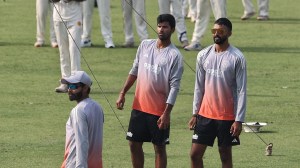Dont encroach on court powers: SC to Governors
A Governor's power of granting pardon under Article 161 being an exercise of executive function.
State Governors have no right to encroach into the judiciary’s “exclusive domain” and use their constitutional power of pardon to decide on the innocence or otherwise of an accused in a criminal trial,the Supreme Court held on Thursday.
The apex court’s ruling came in a case in which the Punjab Governor,using his power of pardon,in July 2007 declared three persons,already convicted of the rape and murder of a school girl and sentenced to life imprisonment by a Sessions Court,innocent even as their criminal appeals were pending in the High Court.
In a judgment which makes apparent the apex court’s reservations about Governors taking into their own hands the functions of the judiciary,the Supreme Court clarified that an act of pardon by a Governor is only an “executive function” and should not in any manner interfere with the court’s power to pronounce an independent verdict on the innocence or guilt of an accused.
“It is well-settled that to decide on the innocence or otherwise of an accused person in a criminal trial is within the exclusive domain of a court of competent jurisdiction as this is essentially a judicial function. A Governor’s power of granting pardon under Article 161 being an exercise of executive function,is independent of the Court’s power to pronounce on the innocence or guilt of the accused,” a Bench of Justices G S Singhvi and A K Ganguly drew the line in their judgment.
“One should not trench upon the other. The power of a court of law in a criminal trial and subsequent appeal right up to the Supreme Court and that of the President/Governor under Articles 72/161 operate in totally different arenas. The nature of these two powers are also totally different from each other,” the court said.
The Punjab Governor’s 2007 order,which said the pardon was granted on “objective and bona fide conditions”,had “exceeded the permissible constitutional limits”,the court observed. Marking its disapproval,the Bench set aside the validity of the order.
The case pertains to the gang-rape and murder of one Kiranjit Kaur in July 1997 while she was returning home from school. Three men sentenced to life imprisonment. But the villagers decided to form a three-member Action Committee among themselves to bring the trio to “book”. They chose Manjit Singh,Prem Kumar and Narayan Dutt for the task. On the day the judgment came out in 2001,according to the the prosecution,the committee members along with four others attacked the rapists at the court complex,causing the death of one.
Though initially their names did not figure in the chargesheet,Singh,Kumar and Dutt were joined later as accused in the trial. The Sessions Court at Barnala found all seven guilty of murder and sentenced them to life imprisonment.
However,the three members wrote to the State Governor simultaneously with filing their appeals against the trial court’s guilty verdict. On July 24,2007,the Governor pardoned them as innocent even before the High Court reached a decision.
Eventually,the High Court on March 11,2008 acquitted Kumar and Dutt on the benefit of doubt,while confirming Singh’s guilty verdict.





- 01
- 02
- 03
- 04
- 05


























